Unit 1 Protocal Routine
新应用大学英语3职场篇unit1

授课内容上课地点:F304,F306,B333When they are excited, angry, upset and the like.2.what does “magazine sections” mean?Parts of magazines, 8 or 12 pages long.3.how many steps are there in the process before delivering?Five: take out, roll, slip, band and slide.Lines 51-661.what do you think of the father’s answer?Clever and sensible. It is a lie, a harmless lie, one told in order to avoid upsetting somebody.2.why did the father say “That’s encouraging”?the sons were learning how to solve the problem of manpower shortage;they hired other people to help, and learnt to improve efficiency by establishing assembly lines.3.why did the mother say “it is very discouraging”?the measures weren’ working at all.Lines 67-771.what do you think of the father’s bonus program?It is reasonable and logical. Bonus is a popular incentive that management adopts. Sometimes we have to lose something in order to gain something. If you are reluctant to use a small bait, you can hardly get a big fish.2.did the son understand that at first thought?No. he thought the more the workers got, the less he obtained.3.why did the son answer “Yes, Sir”?he had come to realize it was a business and he took the father’s instructions as and order.Lines 78-861.what does “see the color of cash” mean?See Note 7 in your text book.2.what’s the difference between the original payment and the demanded one?The original payment was five dollars per person, shile now they demanded five dollars per hour.3.who probably played the mediating role?The mother.Lines 87-94Why did the son think it “enough”?No matter how much, it was the money they made by themselves with great efforts and they learnt a lot from the experience.Lines 95-1091.what did the youngest sons learn from their college brothers?。
大学英语综合教程第四册Unit1

Further Understanding True or False
Interview
Multiple Choice Answer the Questions
Unit 1 Changes in the Way We Live
Before Reading Global Reading Detailed Reading After Reading Supplementary Reading
Unit 1 Changes in the Way We Live
Before Reading Global Reading Detailed Reading After Reading Supplementary Reading
4. We were told that the first winter has left a deep impression on you. Could you please say something about that? (snow; storm; wood; apples) 5. What did you do when spring came? (two floods; growing season; wave of produce; freezer; cupboards; basement; barn)
Unit 1 Changes in the Way We Live
Before Reading Global Reading Detailed Reading After Reading Supplementary Reading
Multiple Choice Choose the best answer to complete the sentence. 1. The writer quitted his job because __________. A) he thought he would have a better time in the countryside B) he would have more work to do in the year to come C) he was sure that he had enough money to support his family D) he just wanted to improve the quality of his family’s life in the country
秘书英语Unit 1
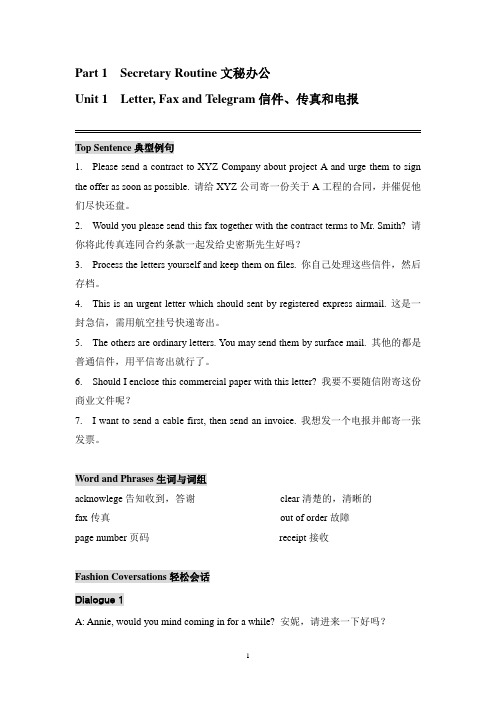
Part 1 Secretary Routine文秘办公Unit 1 Letter, Fax and Telegram信件、传真和电报Top Sentence典型例句1. Please send a contract to XYZ Company about project A and urge them to sign the offer as soon as possible.请给XYZ公司寄一份关于A工程的合同,并催促他们尽快还盘。
2. Would you please send this fax together with the contract terms to Mr. Smith? 请你将此传真连同合约条款一起发给史密斯先生好吗?3. Process the letters yourself and keep them on files.你自己处理这些信件,然后存档。
4. This is an urgent letter which should sent by registered express airmail.这是一封急信,需用航空挂号快递寄出。
5. The others are ordinary letters. You may send them by surface mail.其他的都是普通信件,用平信寄出就行了。
6. Should I enclose this commercial paper with this letter?我要不要随信附寄这份商业文件呢?7. I want to send a cable first, then send an invoice.我想发一个电报并邮寄一张发票。
Word and Phrases生词与词组acknowlege告知收到,答谢clear清楚的,清晰的fax传真out of order故障page number页码receipt接收Fashion Coversations轻松会话Dialogue 1A: Annie, would you mind coming in for a while? 安妮,请进来一下好吗?B: Sure, sir. 好的,先生。
中级口译-考试资料
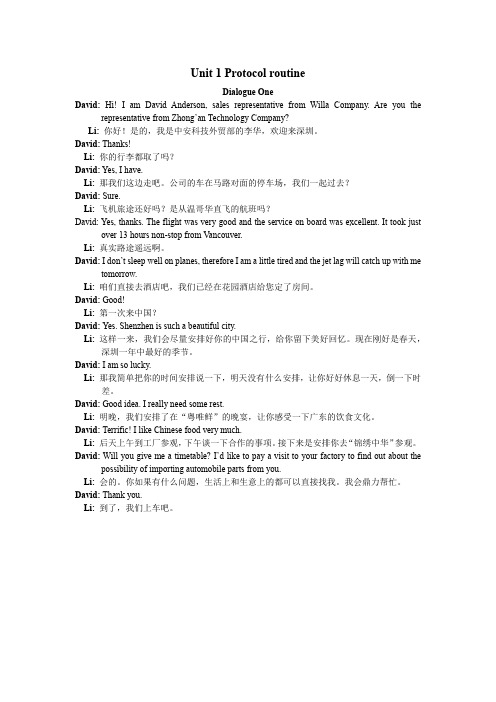
Unit 1 Protocol routineDialogue OneDavid:Hi! I am David Anderson, sales representative from Willa Company. Are you the representative from Zhong’an Technology Company?Li: 你好!是的,我是中安科技外贸部的李华,欢迎来深圳。
David: Thanks!Li:你的行李都取了吗?David: Yes, I have.Li:那我们这边走吧。
公司的车在马路对面的停车场,我们一起过去?David: Sure.Li: 飞机旅途还好吗?是从温哥华直飞的航班吗?David: Yes, thanks. The flight was very good and the service on board was excellent. It took just over 13 hours non-stop from Vancouver.Li: 真实路途遥远啊。
David: I don’t sleep well on planes, therefore I am a little tired and the jet lag will catch up with me tomorrow.Li:咱们直接去酒店吧,我们已经在花园酒店给您定了房间。
David: Good!Li:第一次来中国?David: Yes. Shenzhen is such a beautiful city.Li:这样一来,我们会尽量安排好你的中国之行,给你留下美好回忆。
现在刚好是春天,深圳一年中最好的季节。
David: I am so lucky.Li: 那我简单把你的时间安排说一下,明天没有什么安排,让你好好休息一天,倒一下时差。
David: Good idea. I really need some rest.Li:明晚,我们安排了在“粤唯鲜”的晚宴,让你感受一下广东的饮食文化。
商务现场口译UNIT1 总主编:徐小贞

Performing --Coordinating (Field Interpreting)
1.
2.
3. 4.
5.
6. 7.
8.
9. 10.
销售代表 外贸部 取行李 停车场 直达航班 明天,会有时差反应 这样一来 倒一下时差 广东饮食 锦绣中华
1. 2.
3. 4.
5.
6.
7. 8. 9tive International Business Department claim luggage parking lot non-stop flight The jet lag will catch up with me tomorrow. in that case recover from jet lag the Cantonese gourmet Splendid China
Situation A You are the receptionist of A&R Company. A visitor, Mr. Carl Smith, has an appointment with the General Manager, John Lewis, but he is in a meeting at the moment. You receive the visitor and start a conversation with him. You speak Chinese while Carl is an English-speaker. Situation B You are Assistant Manager of Company Nike. Go to the airport to welcome Peter O’Donnell, a trainee manager in the head office in New York. Greet him, introduce yourself and make a small talk. On the way to the hotel, introduce the city and some places of interest. You speak Chinese while Peter is an English-speaker.
2019版人教版高中英语选择性必修1第一册单词表

2019版人教版高中英语选择性必修第一册单词表unit1physiology[ˌfɪzɪˈɒləʤi]n. 生理学;生理机能artemisinin[,ɑːtɪ'miːsɪnɪn]n. [药]青蒿素crucial[ˈkruːʃəl]adj. 至关重要的;关键性的malaria[məˈleərɪə]n. 疟疾vital[ˈvaɪtl]adj. 必不可少的;极其重要的;充满生机的committed[kəˈmɪtɪd]adj. 尽心尽力的;坚定的;坚信的commit[kəˈmɪt]v vi. 承诺;保证(某个人、机构等);. 忠于;全心全意投入(工作、活动等)commit oneself to do[kəˈmɪt wʌnˈsɛlf tuː duː]承诺;保证(做某事、遵守协议或安排等academy[əˈkædəmi]n. (艺术、文学、科学等的)研究院;学会;专科院校academic[ˌækəˈdɛmɪk]adj. 学业的;学术的objective[əbˈʤɛktɪv]n adj. 目标;目的;. 客观的botanical[bəˈtænɪkəl]adj. 植物学的evaluate[ɪˈvæljʊeɪt]vt. 评价;评估property[ˈprɒpəti]n. 性质;特征;财产distinct[dɪsˈtɪŋkt]adj. 清晰的;清楚的;有区别的extract[ˈɛkstrækt]n vt. 提取物;摘录;. 提取;提炼;摘录;(用力)拔出wormwood[ˈwɜːmwʊd]n. 蒿;洋艾boil[bɔɪl]vt. &vi n. (使)沸腾;煮开;烧开;. 沸腾;沸点liquid[ˈlɪkwɪd]n adj.. 液体; 液体的;液态的obtain[əbˈteɪn]v t vi. (尤指经努力)获得;贏得;. (规章、习俗等)存在;流行acknowledge[əkˈnɒlɪʤ]vt. 承认(属实、权威等);(公开)感谢defeat[dɪˈfiːt]n vt. 失败;挫败;. 击败;战胜analyse[ˈænəlaɪz]vt. 分析apparently[əˈpærəntli]adv. 显而易见;看来;显然substance[ˈsʌbstəns]n. 物质;物品;事实根据insist[ɪnˈsɪst]vi. &vt. 坚持;坚决要求insist on[ɪnˈsɪst ɒn]坚決要求scientific[ˌsaɪənˈtɪfɪk]adj. 科学(上)的;关于科学的mostly[ˈməʊstli]adv. 主要地;一般地wear and tear[weər ænd teə](正常使用造成的)磨损;损耗conclusion[kənˈkluːʒən]n. 结论;推论penicillin[ˌpɛnɪˈsɪlɪn]n. 青霉素;盘尼西林flee[fliː]vt. (fled,fled)迅速离开;逃跑circumstance[ˈsɜːkəmstəns]n. [usually pl].条件;环境;状况novelist[ˈnɒvəlɪst]n. 小说家novel[ˈnɒvəl]n. (长篇)小说flow[fləʊ]n vi. 流;流动;流畅;供应;. 流;流动chart[ʧɑːt]n vt. 图表;. 记录;制订计划flow chart[fləʊ ʧɑːt]流程图found[faʊnd]vt. 创建;建立;把……建立在infer[ɪnˈfɜː]vt. 推断;推定politician[ˌpɒlɪˈtɪʃən]n. 从政者;政治家;政客numerous[ˈnjuːmərəs]adj. 众多的;许多的theory[ˈθɪəri]n. 理论;学说relativity[ˌrɛləˈtɪvɪti]n. 相对论;相对性formula[ˈfɔːmjʊlə]n. 公式;方程式;配方genius[ˈʤiːniəs]n. (pl. genuses)天才;天资;天赋gentle[ˈʤɛntl]adj. 温柔的;文静的patent[ˈpeɪtənt]n adj. 专利;专利证书;获得专利;. 有专利的;受专利保护的passion[ˈpæʃən]n. 酷爱;激情doctorate[ˈdɒktərɪt]n. 博士学位extraordinary[ɪksˈtrɔːdnri]adj. 不一般的;非凡的;意想不到的gradually[ˈgrædjʊəli]adv. 逐渐地;逐步地photoelectric[ˌfəʊtəʊɪˈlɛktrɪk]adj. 光电的come to power[kʌm tuː ˈpaʊə](开始)掌权;上台institution[ˌɪnstɪˈtjuːʃən]n. 社会公共机构;制度;习俗institute[ˈɪnstɪtjuːt]n. (教育、专业等)机构;机构建筑consequence[ˈkɒnsɪkwəns]n. 结果;后果take up a position[teɪk ʌp ə pəˈzɪʃən]担任;任职moustache[məsˈtɑːʃ]n. 上唇的胡子;髭peculiarity[pɪˌkjuːlɪˈærɪti]n. 个性;特点;怪异的性质encounter[ɪnˈkaʊntə]vt n. 偶然碰到;遇到;. 邂适;遭遇professor[prəˈfɛsə]n. 教授mourn[mɔːn]vt. &. vi. 哀悼;忧伤remarkable[rɪˈmɑːkəbl]adv. 非凡的;显著的device[dɪˈvaɪs]n. 方法;技巧;装置;仪器sum[sʌm]vi n. 总结;概括;. 金额;款项;总数;总和sum up[sʌm ʌp]总结;概括draft[drɑːft]n vt. 草稿;草案;. 起草;草拟Nobel Prize[nəʊˈbɛl praɪz]诺贝尔奖Alexander Fleming[ˌælɪgˈzɑːndə ˈflɛmɪŋ]亚历山大·弗莱明Albert Einstein[ˈælbət ˈaɪnstaɪn]阿尔伯特·爱因斯坦Hitler[ˈhɪtlə]希特勒Elon Musk[ mʌsk]埃隆·马斯克Florence Nightingale[ˈflɒrəns ˈnaɪtɪŋgeɪl]弗洛伦斯·南丁格尔SARS[ɛs-eɪ-ɑːr-ɛs]abbr. 严重急性呼吸综合征Switzerland[ˈswɪtsələnd]瑞士(国家名)Swiss[swɪs]adj n. .瑞士的;(pl. Swiss)瑞士人Isaac Newton[ˈaɪzək ˈnjuːt(ə)n]艾萨克·牛顿Jewish[ˈʤu(ː)ɪʃ]adj. 犹太人的;犹太教的Princeton[ˈprɪnstən]普林斯顿(美国城市)unit2phrase[freɪz]n. 短语;词组persuade[pəˈsweɪd]vt. 劝说;说服switch[swɪʧ]vi&vt n.. 转换;交换;. (使)改变;转变;开关;转换器;改变switch off/on[swɪʧ ɒf/ɒn]关/开(电灯、机器等)distant[ˈdɪstənt]adj. 遥远的;远处的;疏远的;心不在焉的secure[sɪˈkjʊə]a dj vt. 安全的;安心的;可靠的;牢固的;. 获得;拴牢;保护knob[nɒb]n. 旋钮;球形把手appliance[əˈplaɪəns]n. 电器;器具remote[rɪˈməʊt]adj. 远程的;偏远的remote control[rɪˈməʊt kənˈtrəʊl]遥控器;遥控air conditioner[eə kənˈdɪʃənə]空调机;空调设备automatic[ˌɔːtəˈmætɪk]adj. 自动的integrated[ˈɪntɪgreɪtɪd]adj. 各部分密切协调的;综合的integrate[ˈɪntɪgreɪt]vi. &vt. (使)合并;成为一体sensor[ˈsɛnsə]n. 传感器;敏感元件efficient[ɪˈfɪʃənt]a dj. 效率高的;有功效的mode[məʊd]n. 模式;方式;风格routine[ruːˈtiːn]n adj. 常规;正常顺序;. 常规的;日常的daily routine[ˈdeɪli ruːˈtiːn]日常生活preference[ˈprɛfərəns]n. 爱好;偏爱instant[ˈɪnstənt]n adj. 瞬间;片刻;. 立即的;速食的;速溶的command[kəˈmɑːnd]n vt. 指令;命令;控制;. 命令;控制obey[əˈbeɪ]vi. &vt. 服从;遵守warning[ˈwɔːnɪŋ]n. 警告;警示;先兆constant[ˈkɒnstənt]adj n. .不断的;重复的;不变的;. 常数;常量early on[ˈɜːli ɒn]在初期;早先abnormal[æbˈnɔːməl]adj. 不正常的;反常的critical[ˈkrɪtɪkəl]adj. 严重的;关键的;批判性的cancer[ˈkænsə]n. 癌;癌症;毒瘤potentially[pəʊˈtɛnʃəli]adv. 潜在地;可能地potential[pəʊˈtɛnʃəl]adj n. .可能的;潜在的;. 潜力;可能性leak[liːk]vi&vt n.. 漏;渗漏;透露;. 漏洞;裂缝;透露electrical[ɪˈlɛktrɪkəl]adj. 电的;用电的wiring[ˈwaɪərɪŋ]n. 电线线路;线路系统wire[ˈwaɪə]n vt. 电线;金属丝(或线);. 接通电源;将……连接到detect[dɪˈtɛkt]vt. 发现;查明relevant[ˈrɛlɪvənt]adj. 有关的;有意义的catch fire[kæʧ ˈfaɪə]着火fantasy[ˈfæntəsi]n. 幻想;想象innovation[ˌɪnəʊˈveɪʃən]n. 创新;创造available[əˈveɪləbl]adj. 可获得的;可购得的;(人)有空的in this sense[ɪn ðɪs sɛns](in…sense)从这种(某种)意义上来讲nevertheless[ˌnɛvəðəˈlɛs]a dv. 尽管如此;不过;然而structure[ˈstrʌkʧə]n vt. 结构;体系;. 系统安排;精心组织security[sɪˈkjʊərɪti]n. 保护描施;安全工作crime[kraɪm]n. 犯罪活动;不法行为combine[ˈkɒmbaɪn]vt. &vi. (使)结合;混合nanobot n. 纳米机器人artificial[ˌɑːtɪˈfɪʃ(ə)l]adj. 人工的;人造的;假的artificial intelligence[ˌɑːtɪˈfɪʃ(ə)l ɪnˈtɛlɪʤəns](AI)人工智能clone[kləʊn]vt n. 克隆;以无性繁殖技术复制;. 克隆动物(或植物)predict[prɪˈdɪkt]vt. 预测;预言;预料prediction[prɪˈdɪkʃən]n. 预测;预言forecast[ˈfɔːkɑːst]vt. &n. 预测;预报occupation[ˌɒkjʊˈpeɪʃən]n. 职业;占领oppose[əˈpəʊz]vt. 反对;抵制;阻挠hence[hɛns]adv. 因此;由此cease[siːs]vi. &vt. (使)停止;终止deceased[dɪˈsiːst]adj. 已死的;亡故的absence[ˈæbsəns]n. 不存在;缺乏;缺席rural[ˈrʊərəl]adj. 乡村的;农村的advocate[ˈædvəkɪt]n n. 提倡;支持;拥护;. 提倡者;支持者;拥护者emphasis[ˈɛmfəsɪs]n. 强调;重视;重要性luxury[ˈlʌkʃəri]n. 奢华keep in touch with...[kiːp ɪn tʌʧ wɪð...]与……保持联系;了解(某课题或领域的情况)career[kəˈrɪə]n. 职业;事业prospect[ˈprɒspɛkt]n. 可能性;前景resist[rɪˈzɪst]vi. &vt. 抵制;反抗;抵挡resistance[rɪˈzɪstəns]n. 抵制;反对;抗拒paragraph[ˈpærəgrɑːf]n. 段;段落signpost[ˈsaɪnpəʊst]n. 路标essay[ˈɛseɪ]n. 文章accurate[ˈækjʊrɪt]adj. 精确的;准确的librarian[laɪˈbreərɪən]n. 图书管理员;图书馆馆长Melbourne[ˈmɛlbən]墨尔本(澳大利亚城市)Christian[ˈkrɪsʧən]n adj. 基督教徒;. 基督教的the Amish n. 阿曼门诺派unit3buffet[ˈbʌfɪt]vt n. 连续猛击;打来打去;. 自助餐cloth[klɒθ]n. (一块)布;织物;布料edge[ɛʤ]n vt. &vi. 边;边缘;边线;刀刃;. (使)徐徐移动;给……加边valley[ˈvæli]n. 谷;山谷;溪谷vast[vɑːst]adj. 辽阔的;巨大的;庞大的glacier[ˈglæsiə]n. 冰川reindeer[ˈreɪndɪə]n. 驯鹿territory[ˈtɛrɪtəri]n. 领士;版图;领域;地盘ban[bæn]vt n. 明令禁止;取缔;. 禁令boundary[ˈbaʊndəri]n. 边界;界限;分界线cottage[ˈkɒtɪʤ]n. 小屋;(尤指)村舍;小别墅visible[ˈvɪzəbl]a dj. 看得见的;可见的on the move[ɒnðəmuːv]在行进中;在移动中accompany[əˈkʌmpəni]vt. 陪同;陪伴;伴随;(尤指用钢琴)为……伴奏adopt[əˈdɒpt]vt vt. &vi. 采用;采取;采纳;. 领养sour[ˈsaʊə]adj. 酸的;有酸味的set out[sɛt aʊt]出发;启程;(怀着目标)开始工作bless[blɛs]vt. 祝福live off依靠……生活;以吃……为生prohibition[ˌprəʊɪˈbɪʃən]n. 禁止;阻止;禁令prohibit[prəˈhɪbɪt]vt. (尤指以法令)禁止;阻止journalist[ˈʤɜːnəlɪst]n. 新闻记者;新闻工作者sneeze[sniːz]vi n. 打喷嚏;. 喷嚏;喷嚏声teapot[ˈtiːˌpɒt]n. 茶壶label[ˈleɪbl]vt n. 用标签标明;贴标签;. 标签;标记cream[kriːm]n adj. 奶油;乳脂;护肤霜;. 奶油色的;濙黄色的leopard[ˈlɛpəd]n. 豹stretch[strɛʧ]vi. &vt. 延伸;延续;. 伸展;舒展rewarding[rɪˈwɔːdɪŋ]adj. 值得做的;有益的bush[bʊʃ]n. 灌木lung[lʌŋ]n. 肺cycle[ˈsaɪkl]n vi. 自行车;摩托车;循环;. 骑自行车corridor[ˈkɒrɪdɔː]n. 狭长地带;走廊;过道;通道pedal[ˈpɛdl]n vt. &vi. (自行车等的)脚镫子;踏板;. 骑自行车;踩踏板fountain[ˈfaʊntɪn]n. 喷泉;人工喷泉;喷水池route[ruːt]n. 路线;路途;途径ahead[əˈhɛd]adv. 向前;在前面;提前theme[θiːm]adj n. .有特定主题的;. 主题;主题思想theme park[θiːm pɑːk]主题公园;主题乐园roller coaster[ˈrəʊləˈkəʊstə]n. 过山车incredible[ɪnˈkrɛdəbl]adj. 极好的;极大的;难以置信的appeal[əˈpiːl]vi n. 有吸引力;呼吁;恳求;上诉;. 吸引力;呼吁;上诉;请求appeal to[əˈpiːl tuː]有吸引力;有感染力;呼呼;上诉;打动pirate[ˈpaɪərɪt]n vt. 海盗;盗版者;. 盗印;窃用adorable[əˈdɔːrəbl]adj. 可爱的;讨人喜爱的wander[ˈwɒndə]n vt. &vi. 游荡;闲逛;流浪;. 闲逛;漫游;走失;离散;走神amusement[əˈmjuːzmənt]n. 娱乐(活动);愉悦amuse[əˈmjuːz]vt. (提供)消遣;(使)娱乐enormous[ɪˈnɔːməs]adj. 巨大的;极大的swing[swɪŋ]vt. &vi. (swung,swung)(使)摆动;摇摆;转弯;(使)突然转向iron[ˈaɪən]n vt. &vi. 铁;铁器;铸铁;熨斗;. (用熨斗)熨;烫平fashion[ˈfæʃən]n. 时尚;时兴;流行款式rare[reə]adj. 稀少的;珍贵的;(肉)半熟的steam[stiːm]n vi. 蒸汽;水蒸气;蒸汽动力;. 蒸发;散发蒸汽;冒水汽superb[sju(ː)ˈpɜːb]adj. 极佳的;卓越的aquarium[əˈkweərɪəm]n.(pl. aquariums/aquaria)水族馆;水族玻璃槽;养鱼缸up to[ʌp tuː]达到(某数量、程度等);直到;不多于;(体力或智力上)能胜任polar[ˈpəʊlə]adj. (近)极地的;南极(或北极)的;磁极的upside down[ˈʌpsaɪd daʊn]颠倒;倒转;翻转splendid[ˈsplɛndɪd]adj. 壮丽的;雄伟的;极佳的;非常好的display[dɪsˈpleɪ]n vt. 展览;陈列;展览品;. 显示;陈列appetite[ˈæpɪtaɪt]n. 食欲;胃口;强烈欲望entertainment[ˌɛntəˈteɪnmənt]n. 娱乐;招待;娱乐活动;文娱节目column[ˈkɒləm]n. (书、报纸印刷页上的)栏;专栏;柱(形物)Sami萨米人(居住在斯堪的纳维亚北部的拉普人)Sarek National Park萨勒克国家公园Sweden瑞典(国家名)the Arctic Circle北极圈Rapa拉帕河Siberian adj n. .西伯利亚(人)的;. 西伯利亚人Dollywood多莉山主题公园unit4interaction[ˌɪntərˈækʃən]n. 交流;相互影响vary[ˈveəri]vi. (根据情况)变化;改变appropriate[əˈprəʊprɪɪt]adj. 合适的;恰当的by contrast[baɪ ˈkɒntrɑːst]相比之下approve[əˈpruːv]vi vt. 赞成;同意;. 批准;通过demonstrate[ˈdɛmənstreɪt]vt. 表现;表达;说明;证明gesture[ˈʤɛsʧə]n. 手势;姿势;姿态witness[ˈwɪtnɪs]v t n. 当场看到;目击;见证;. 目击者;证人employ[ɪmˈplɔɪ]vt. 使用;应用;雇用identical[aɪˈdɛntɪkəl]adj. 相同的interpret[ɪnˈtɜːprɪt]vt vi. &vt. 把……理解(解释)为;. 口译differ[ˈdɪfə]vi. 相异;不同于by comparison[kəmˈpærɪsn](与……)相比较cheek[ʧiːk]n. 面频;脸频favour[ˈfeɪvə]vt n. 较喜欢;选择;有利于;. 帮助;恩惠;赞同bow[baʊ]vi vt n.. 鞠躬;点头;. 低(头); 弓;蝴蝶结waist[weɪst]n. 腰;腰部make inferences推理;推断break down消除;分解;打破barrier[ˈbærɪə]n. 隔阂;障碍fake[feɪk]adj. 假装的;假的;冒充的anger[ˈæŋgə]n vt. 愤怒;怒气;. 使生气;激怒reliable[rɪˈlaɪəbl]adj. 可靠的;可信赖的incident[ˈɪnsɪdənt]n. 发生的事情;严重事件;冲突trial[ˈtraɪəl]n. &v. 审讯;审判;试验;试用slight[slaɪt]adj. 轻微的;略微的;细小的slightly[ˈslaɪtli]adv. 略微;稍微twin[twɪn]adj n. .双胞胎之一的;孪生之一的;. 孪生之一;双胞胎之一nonverbal[nɒnˈvɜːb(ə)l]adj. 不涉及言语的;非言语的assessment[əˈsɛsmənt]n. 评价;评定assess[əˈsɛs]vt. 评估;评价internal[ɪnˈtɜːnl]adj. 内部的;里面的straighten up[ˈstreɪtn ʌp]直起来;整理;收拾整齐slump[slʌmp]v. 垂头弯腰地走(或坐等)pose[pəʊz]n vi vt.. 故作姿态;(为画像、拍照等摆的)姿势;. 摆好姿势; 造成(威胁、问题等)bend[bɛnd]vt. &v. (bent,bent)(使)弯曲;倾斜;偏向reveal[rɪˈviːl]vt. 揭示;显示;露出clarify[ˈklærɪfaɪ]vt. 使更清晰易懂;阐明;澄清in other words换句话说;也就是说educator[ˈɛdju(ː)keɪtə]n. 教师;教育工作者;教育家tick[tɪk]v t vi n. . 给(试卷、问题等)打钩号;. (钟表)发出嘀嗒声;钩号tendency[ˈtɛndənsi]n. 趋势;倾向lower[ˈləʊə]vt adj. 把……放低;降低;减少;. 下面的;下方的;较小的imply[ɪmˈplaɪ]vt. 意味着;暗示barely[ˈbeəli]adv. 几乎不;勉强才能;刚刚chin[ʧɪn]n. 下巴occupy[ˈɒkjʊpaɪ]vt. 占据;占用stare[steə]vi n. 盯着看;凝视;. 凝视ceiling[ˈsiːlɪŋ]n. 天花板;上限distract[dɪsˈtrækt]vt. 分散(注意力);使分心perceive[pəˈsiːv]vt. 察觉;看待;理解distinguish[dɪsˈtɪŋgwɪʃ]vi. &vt. 区分;辨别anxiety[æŋˈzaɪəti]n. 焦虑;担心;害怕chest[ʧɛst]n. 胸部;胸膛embarrassed[ɪmˈbærəst]adj. 难堪的;尴尬的ashamed[əˈʃeɪmd]adj. 羞愧;惭愧merely[ˈmɪəli]adv. 只是;仅仅;只不过call[kɔːl]on(短暂地)访问;要求(某人讲话等);正式邀请bother[ˈbɒðə]vi. &vt n. 费心;麻烦;因……操心;. 麻烦;不便weep[wiːp]vi. &vt. 哭泣;流泪at work[æt wɜːk]有某种影响;在工作conflict[ˈkɒnflɪkt]n vi. 矛盾;冲突;. 冲突;抵触inquire[ɪnˈkwaɪə](=enquire)vi. &vt. 询问;打听ultimately[ˈʌltɪmɪtli]adv. 最终;最后adjust[əˈʤʌst]v i. &vt. 调整;调节;. 适应;(使)习惯intervene[ˌɪntə(ː)ˈviːn]vi. 干预;介入react[ri(ː)ˈækt]vi. (对……)起反应;回应;(对食物等)有不良反应component[kəmˈpəʊnənt]n. 组成部分;零件tone[təʊn]n. 语气;腔调;口吻Brazil[brəˈzɪl]巴西(国家名)Bulgaria[bʌlˈgeərɪə]保加利亚(国家名)Albania[ælˈbeɪnɪə]阿尔巴尼亚(国家名)unit5hybrid[ˈhaɪbrɪd]n. 杂交植(动)物;合成物;混合动力车devote[dɪˈvəʊt]vt. 把……献(给);把……专用于;专心于devote...to把……用于;献身;致力;专心shortage[ˈʃɔːtɪʤ]n. 不足;缺少;短缺tackle[ˈtækl]vt. 解决(难题);应付(局面);处理crisis[ˈkraɪsɪs]n. (pl. crises)危机;危急关头boost[buːst]vt n. 使增长;使兴旺;. 增长;提高;激励yield[jiːld]n vt vi. . 产量;产出;. 出产(作物);产生(收益、效益等);屈服;让步convince[kənˈvɪns]vt. 使相信;使确信;说服characteristic[ˌkærɪktəˈrɪstɪk]n adj. 特征;特点;品质;. 典型的;独特的attain[əˈteɪn]vt. (通常经过努力)获得;得到conventional[kənˈvɛnʃənl]adj. 传统的;习惯的pollinate[ˈpɒlɪneɪt]vt. 授粉;传粉assumption[əˈsʌmpʃ(ə)n]n. 假定;设定;(责任的)承担;(权利的)获得intense[ɪnˈtɛns]adj. 热切的;十分强烈的;激烈的overcome[ˌəʊvəˈkʌm]vt. (overcame,overcome)克服;解决;战胜expand[ɪksˈpænd]vt. &vi . 扩大;增加;. 扩展;发展(业务)output[ˈaʊtpʊt]n vt. . 产量;输出;输出量;(output,output)输出estimate[ˈɛstɪmɪt]vt n. 估计;估价;估算;. 估计;估算domestic[dəʊˈmɛstɪk]adj. 本国的;国内的;家用的;家庭的consumption[kənˈsʌm(p)ʃən]n. 消耗;消耗量;消费comprise[kəmˈpraɪz]. 包括;包含;由……组成be comprised of包括;包含;由……组成(或构成)generate[ˈʤɛnəreɪt]vt. 产生;引起strain[streɪn]n. (动、植物的)系;品种;拉伤;压力ensure[ɪnˈʃʊə]n. 闲暇;休闲;空闲deep down[diːp daʊn]在内心深处;本质上;实际上soil[sɔɪl]n. 泥士;土壤;国土;领土celebrity[sɪˈlɛbrɪti]n. 名望;名誉;名人;名流envision[ɪnˈvɪʒən]vt. 展望;想象sorghum[ˈsɔːgəm]n. 高梁;高梁米broom[brʊm]n. 扫把;扫帚;金雀花grain[greɪn]n. 谷物;谷粒;颗粒vision[ˈvɪʒən]n. 想象;视力;视野;影像reality[ri(ː)ˈælɪti]n. 现实;实际情况;事实salty[ˈsɔːlti]adj. 含盐的;咸的urban[ˈɜːbən]adj. 城市的;都市的;城镇的bomb[bɒm]n v. 炸弹;. 轰炸;对……投炸弹tunnel[ˈtʌnl]n. 地下通道;地道;隧道extension[ɪksˈtɛnʃən]n. 扩建部分;扩大;电话分机chemical[ˈkɛmɪkəl]adj n. .与化学有关的;化学的;. 化学制品;化学品wheat[wiːt]n. 小麦;小麦籽flavor[ˈfleɪvə]n. 味道;特点;特色fertilizer[ˈfɜːtɪlaɪzə]n. 肥料nutritional[nju(ː)ˈtrɪʃən(ə)l]adj. 营养(物)的nutritious[nju(ː)ˈtrɪʃəs]adj. 有营养的;营养丰富的nutrition[nju(ː)ˈtrɪʃən]n. 营养;滋养alleviate[əˈliːvɪeɪt]vt. 减轻;缓解poverty[ˈpɒvəti]n. 贫穷;贫困organic[ɔːˈgænɪk]adj. 有机的;不使用化肥的;有机物的pesticide[ˈpɛstɪsaɪd]n. 杀虫剂;除害药物widespread[ˈwaɪdsprɛd]a. 分布广的;普遍的;广泛的bacterium[bækˈtɪərɪəm]n. 细菌in turn[ɪn tɜːn]相应地;转而;依次;轮流digest[ˈdaɪʤɛst]vt. &vi n. . 消化;. 领会;领悟;摘要;文摘essential[ɪˈsɛnʃəl]adj. 完全必要的;极其重要的mineral[ˈmɪnərəl]n. 矿物;矿物质alternative[ɔːlˈtɜːnətɪv]n adj. 可供选择的事物;. 可供替代的;非传统的grocery[ˈgrəʊsəri]n. 食品杂货店;[pl. ]食品杂货instance[ˈɪnstəns]n. 例子;实例;事例for instance[fɔːrˈɪnstəns]例如;比如depth[dɛpθ]n. 向下(或向里)的距离;深(度)root[ruːt]n. 根;根茎;根部;根源entirely[ɪnˈtaɪəli]adv. 全部地;完整地;完全地aspect[ˈæspɛkt]n. 方面;层面Vietnam[ˌvjɛtˈnɑːm]越南(国家名)LED abbr.(light-wmitting diode)发光二极管DDT n. 滴滴涕(旧时尤用作农业杀虫剂)。
初一下册UnitMyDailyRoutine教学解析
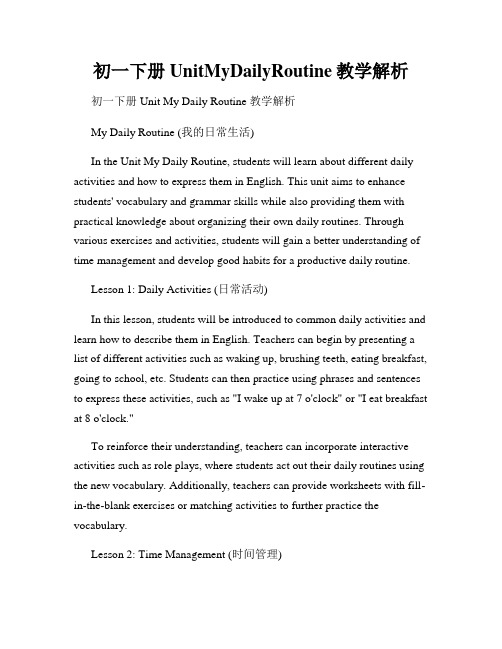
初一下册UnitMyDailyRoutine教学解析初一下册Unit My Daily Routine 教学解析My Daily Routine (我的日常生活)In the Unit My Daily Routine, students will learn about different daily activities and how to express them in English. This unit aims to enhance students' vocabulary and grammar skills while also providing them with practical knowledge about organizing their own daily routines. Through various exercises and activities, students will gain a better understanding of time management and develop good habits for a productive daily routine.Lesson 1: Daily Activities (日常活动)In this lesson, students will be introduced to common daily activities and learn how to describe them in English. Teachers can begin by presenting a list of different activities such as waking up, brushing teeth, eating breakfast, going to school, etc. Students can then practice using phrases and sentences to express these activities, such as "I wake up at 7 o'clock" or "I eat breakfast at 8 o'clock."To reinforce their understanding, teachers can incorporate interactive activities such as role plays, where students act out their daily routines using the new vocabulary. Additionally, teachers can provide worksheets with fill-in-the-blank exercises or matching activities to further practice the vocabulary.Lesson 2: Time Management (时间管理)In this lesson, students will explore the importance of time management in their daily lives. Teachers can introduce the concept of time management and discuss the benefits of having a well-organized schedule. Students can share their own experiences and challenges in managing their time effectively.To engage the students, teachers can incorporate group discussions and brainstorming sessions on strategies for improving time management skills. Students can also learn to create a daily schedule or routine chart, prioritizing tasks and allocating time for different activities. By applying these skills, students will develop a sense of responsibility and learn to make the most of their time.Lesson 3: Healthy Habits (健康习惯)In this lesson, students will focus on developing healthy habits as part of their daily routine. Teachers can introduce the significance of healthy habits such as exercising, eating nutritious meals, and getting enough sleep. Discussions can be held on the benefits of each habit, as well as the potential consequences of neglecting them.Teachers can provide examples and explanations of different healthy habits, using visual aids such as diagrams or pictures. Students can actively participate by sharing their personal experiences and expressing their opinions on the importance of maintaining a healthy lifestyle.Lesson 4: Review and Assessment (复习与评估)In this final lesson of the unit, teachers can conduct a comprehensive review of the vocabulary and grammar covered throughout the unit. This canbe done through various activities such as quizzes, games, or group projects. The purpose of the review is to assess students' understanding of the material and provide them with an opportunity to consolidate their learning.Teachers can also assign a writing task, where students are required to write about their daily routine in English. This will allow teachers to evaluate students' writing skills, grammar usage, and overall comprehension of the unit. Feedback and suggestions for improvement can be provided to help students enhance their language abilities.ConclusionThe Unit My Daily Routine provides students with a practical and essential foundation in English language skills. By understanding and implementing effective daily routines, students will not only improve their language proficiency but also develop valuable life skills such as time management and healthy habits. With continuous practice and guidance, students will be well-equipped to navigate their daily lives with confidence and efficiency.。
北师大版英语七年级下册Unit 1单词及短语

Unit 1 Daily LifeGetting Ready名词Nouns1. routine常规;正常顺序e.g.: We are trying to get the baby into a routine for feeding and sleeping.2. tooth牙齿e.g.: I’ve just had a tooth out at the dentist’s.3. face 脸;面孔e.g.: He buried his face in his hands.动词Verbs1. wash 洗e.g.: She washed the blood from his face.形容词Adjectives1. daily每日的;日常的e.g.: Commuting is a part of daily life for many people.兼类词Words with Multiple Part of Speech1. sleep v., n.睡觉e.g.: I couldn’t sleep because of the noise.短语Expressions1. get up 起床e.g.: We’ve got to get up early, all right?2. go to bed上床睡觉e.g.: I think it’s time to go to bed.3. go to school去上学e.g.: You’ve got to go to school, whether you like it or not.4. make one’s bed整理床铺e.g.: After getting up, he makes his bed every morning.5. take a shower洗淋浴e.g.: She was too tired to take a shower.Lesson 1 After School名词Nouns1. activity活动e.g.: The club provides a wide variety of activities including tennis, swimming and volleyball.2. drum鼓e.g.: Someone was beating a drum.3. news新闻;消息e.g.: My grandparents always watch the evening news on TV.4. note笔记;记录;便条e.g.: I usually watch my notes first and then do my homework.5. cinema电影院e.g.: I used to go to the cinema every week.动词Verbs1. finish 完成;结束e.g.: She finished law school last year.形容词Adjectives1. after-school 课外的e.g.: I was busy taking after-school classes for the weekend.副词Adverbs1. never 从不;决不e.g.: We never watch TV at home.2. alone独自;单独e.g.: I don’t like going out alone at night.3. seldom不常;很少e.g.: She goes to clubs after school seldom.4. always总是;一直e.g.: Always, they read books in the evening.5. sometimes有时;间或e.g.: We watch the evening news sometimes.兼类词Words with Multiple Part of Speech1. early adv.提早,提前adj.早期的;早到的;提早的e.g.: We’ve got to get up early, all right?2. match n.比赛;竞赛;火柴v.匹配e.g.: We badly need to get a result from this match.短语Expressions1. a lot of 许多的;大量的e.g.: We’ve got a lot of hard work ahead.Lesson 2 A Dangerous Job名词Nouns1. fire火;火灾e.g.: If there is a fire or someone calls 911, we have to stop everything and get out fast.2. firefighter消防员e.g.: I live in a room with seven other firefighters.3. training训练;培训e.g.: At 6:00, training starts with team exercise.4. km=kilometre千米,公里e.g.: We always run 5 km.5. firefighting消防e.g.: There was no firefighting equipment.动词Verbs1. eat 吃e.g.: We have to eat very fast because we do not have much time.2. practise训练;练习e.g.: We practise three skills: driving, firefighting and communicating.3. drive驾驶,开车e.g.: I drove to work this morning.4. communicate交流;沟通e.g.: We only communicate by email.5. keep(使)保持;处于e.g.: She kept the children amused for hours.形容词Adjectives1. important 重要的e.g.: Things can be dangerous and difficult, but I think I have an important and interesting job!2. dangerous危险的e.g.: The traffic here is very dangerous for children.3. difficult困难的;费力的e.g.: It’s difficult for them to get here much before seven.4. easy容易的;轻易的e.g.: He didn’t make it easy for me to leave.5. interesting有趣的;有吸引力的e.g.: It would be interesting to know what he really believed.6. safe安全的e.g.: The children are quite safe here.7. free随心所欲的;言行自由的e.g.: He doesn’t have free time every day.8. false不正确的;不真实的e.g.: She gave false information to the insurance company.副词Adverbs1. later 以后;后来e.g.: One hour later, we have our breakfast.代词Pronouns1. someone 某人e.g.: There’s someone at the door.连词Conjunctions1. because 因为e.g.: I did it because he told me to.2. if如果;假若e.g.: If you see him, give him this note.3. or或者e.g.: Is your sister older or younger than you?兼类词Words with Multiple Part of Speech1. rest n.休息时间;剩余部分v.休息e.g.: I had a good night’s rest.2. try v.试;试图n.尝试;努力e.g.: I don’t know if I can come but I’ll try.3. best n.最好的事物(或人)adj.最好的adv.最好地e.g.: We all want the best for our children.短语Expressions1. not…at all 一点也不……e.g.: It’s not easy at all.2. have to必须;不得不e.g.: You don’t have to knock-just walk in.3. try one’s best尽某人最大努力e.g.: We must try our best to keep everyone safe.Lesson 3 Safety First名词Nouns1. safety安全;平安e.g.: Next week is Fire Safety Week at school.2. bicycle自行车e.g.: He got on his bicycle and rode off.3. storm暴风雨e.g.: I think walking in a storm is dangerous, and going online is not.4. lightning闪电e.g.: During bad lightning storms, we usually stay at home, close the windows and don’t use our phones.5. kid小孩e.g.: Do you know the other kids?6. address地址e.g.: Please don’t give them your address or phone number and don’t meet an Internet friend.7. bath洗澡;洗浴e.g.: I think I’ll have a bath and go to bed.动词Verbs1. stay 停留;待e.g.: We stayed to see what would happen.2. mean 意思是e.g.: My mum says it’s dangerous. What does she mean?形容词Adjectives1. bad 坏的;不好的e.g.: Smoking gives you bad breath.副词Adverbs1. away 离开(某距离);去别处e.g.: The beach is a mile away.介词Prepositions1. during 在……期间e.g.: What do we do during storms?兼类词Words with Multiple Part of Speech1. walk v.走;步行n.步行e.g.: The baby is just learning to walk.2. travel v.旅行n.旅行,旅游e.g.: I go to bed early if I’m travelling the next day.3. online adv.在线地adj.在线的,联网的e.g.: I talk to other kids online.4. phone n.电话v.打电话e.g.: I have to make a phone call.5. point n.观点;尖端,点v.指向e.g.: Does she have a point?6. smoke v.吸烟;抽烟n.烟e.g.: Sometimes fires start in bedrooms because some people smoke in bed.短语Expressions1. have a point 有道理e.g.: Does she have a point?2. stay away from离开;不接近e.g.: I want you to stay away from my daughter.Communication Workshop名词Nouns1. minute分钟;一会儿e.g.: I’ll be back in a few minutes.2. star恒星;星;明星e.g.: I like to look at the stars at night.动词Verbs1. need 需要e.g.: I always get up very early because I need to practise tennis.副词Adverbs1. more 更;更多e.g.: After school, I practise more tennis.兼类词Words with Multiple Part of Speech1. dress v.穿衣服n.连衣裙e.g.: She dressed the children in their best clothes.。
七年级下册我的一天英语作文 1~8单元

七年级下册我的一天英语作文1~8单元Seventh Grade My DayUnit 1: Morning RoutineEvery morning, my day starts at 6:30 am. I wake up to the sound of my alarm clock and immediately get out of bed. I brush my teeth, wash my face, and get dressed for the day. Then, I head downstairs to the kitchen to have breakfast with my family. After breakfast, I grab my backpack and head out the door to catch the bus to school.Unit 2: School DayOnce I arrive at school, I go to my locker to get my books for the day. I have a variety of classes including English, Math, Science, and History. I enjoy learning new things in each class and spending time with my friends during lunch. After school, I participate in extracurricular activities such as soccer practice or music club.Unit 3: Afternoon ActivitiesAfter school activities are a big part of my day. I enjoy playing soccer and spending time with my teammates. We practice hard to improve our skills and have fun together.Sometimes, I also have music lessons in the afternoon. Playing the guitar is my favorite hobby and I love to practice and learn new songs.Unit 4: HomeworkWhen I get home in the afternoon, I have a snack and start on my homework. I usually have assignments from each of my classes that I need to complete. I try to finish my homework before dinner so that I have time to relax and unwind before bed. Sometimes I need help from my parents or siblings with my homework, especially if it's a challenging assignment.Unit 5: Family TimeAfter dinner, my family and I spend time together. We talk about our days, watch TV, or play games together. Family time is important to me because it allows us to bond and create memories together. I cherish these moments with my loved ones.Unit 6: RelaxingBefore bed, I like to relax and unwind. I might read a book, listen to music, or watch a movie. It's important for me to have some time for myself to recharge and prepare for the next day. Itry to go to bed early so that I can get a good night's sleep and wake up feeling refreshed in the morning.Unit 7: Bedtime RoutineAt 9:00 pm, I start my bedtime routine. I brush my teeth, wash my face, and change into my pajamas. I like to read a book in bed before turning off the lights. Reading helps me relax and unwind after a long day. I try to go to sleep by 10:00 pm so that I can get enough rest for the next day.Unit 8: ReflectionAs I lay in bed, I reflect on my day. I think about the things I accomplished, the lessons I learned, and the memories I made. I am grateful for the opportunities I have to learn and grow each day. I look forward to the adventures and challenges that tomorrow will bring.In conclusion, my day is filled with a variety of activities and experiences that shape who I am. From my morning routine to my bedtime routine, each part of my day plays a role in my growth and development. I am thankful for the love and support of my family, the friendships I have made, and the opportunities to learn and explore. My seventh grade day is a reflection of who I am and who I aspire to be.。
routine函数

Routine函数中的特定函数1. 函数定义在分析routine函数中的特定函数之前,我们首先要了解routine函数的定义。
routine函数是一个用于创建和管理计划任务的函数,它可以让我们在指定的时间间隔内执行特定的任务。
在编程中,我们经常需要定期执行一些任务,例如定时备份数据、定期发送电子邮件等,这时候routine函数就派上了用场。
2. 特定函数的用途routine函数中的特定函数有多种用途,下面我们将详细介绍其中一些常用的特定函数及其用途。
2.1. scheduleschedule函数用于定义计划任务的执行时间。
它接受一个时间表达式作为参数,用来指定任务的执行时间。
时间表达式可以是一个具体的日期和时间,也可以是一个时间间隔。
schedule函数的用途是让我们能够灵活地设置计划任务的执行时间,可以根据需求指定任务的执行频率,例如每天、每周、每月或每年执行一次。
这样可以确保任务按照预定的时间执行,提高了任务的可靠性和准确性。
2.2. tasktask函数用于定义要执行的任务。
它接受一个函数作为参数,这个函数就是我们要执行的任务。
在task函数中,我们可以编写任意的代码,实现我们需要的功能。
task函数的用途是将我们的任务封装成一个函数,以便在计划任务执行时调用。
通过将任务封装成函数,我们可以更好地组织代码,提高代码的可读性和可维护性。
2.3. run_pendingrun_pending函数用于执行计划任务。
它会检查当前时间是否到达任务的执行时间,并执行相应的任务。
如果当前时间没有到达任务的执行时间,run_pending函数会立即返回,不会等待。
run_pending函数的用途是实际执行计划任务。
它会根据定义的计划任务执行时间来判断是否执行任务,并调用相应的任务函数。
通过调用run_pending函数,我们可以实现计划任务的自动执行,节省了手动执行任务的时间和精力。
2.4. run_allrun_all函数用于立即执行所有计划任务。
新视野第三版第一册Unit1-3单词整理
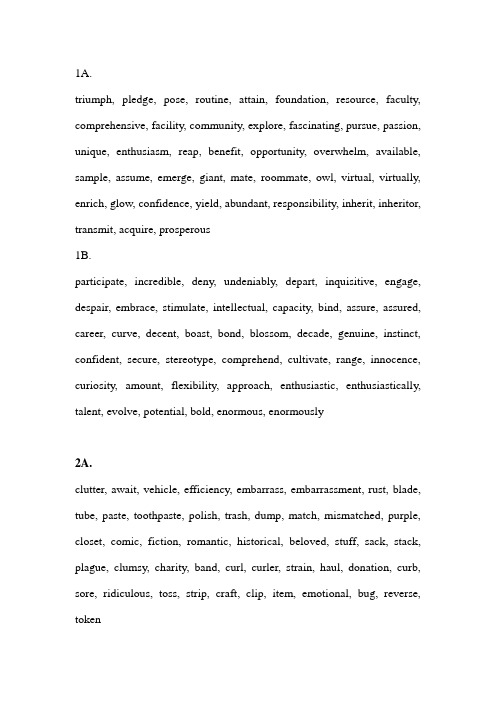
1A.triumph, pledge, pose, routine, attain, foundation, resource, faculty, comprehensive, facility, community, explore, fascinating, pursue, passion, unique, enthusiasm, reap, benefit, opportunity, overwhelm, available, sample, assume, emerge, giant, mate, roommate, owl, virtual, virtually, enrich, glow, confidence, yield, abundant, responsibility, inherit, inheritor, transmit, acquire, prosperous1B.participate, incredible, deny, undeniably, depart, inquisitive, engage, despair, embrace, stimulate, intellectual, capacity, bind, assure, assured, career, curve, decent, boast, bond, blossom, decade, genuine, instinct, confident, secure, stereotype, comprehend, cultivate, range, innocence, curiosity, amount, flexibility, approach, enthusiastic, enthusiastically, talent, evolve, potential, bold, enormous, enormously2A.clutter, await, vehicle, efficiency, embarrass, embarrassment, rust, blade, tube, paste, toothpaste, polish, trash, dump, match, mismatched, purple, closet, comic, fiction, romantic, historical, beloved, stuff, sack, stack, plague, clumsy, charity, band, curl, curler, strain, haul, donation, curb, sore, ridiculous, toss, strip, craft, clip, item, emotional, bug, reverse, token2B.limp, surge, breeze, shiver, complain, chill, chilly, stride, melt, melting, shed, immense, fatigue, aboard, hut, barrel, shell, shellfish, bundle, eel, portion, migrate, migration, wrap, unwrap, suspicious, suspiciously, pinch, vanish, slope, cracker, peak, stretch, overtake, anticipate, reluctance, stoop, restraint, scrape, delicate, grip, gradual, gradually, sway, accompany, pureed, tuna, awkward, sip, champagne3A.campus, transform, fleet, typical, access, accessible, response, engineering, dialect, analyze, script, device, sophisticated, undergraduate, adopt, indispensable, outline, regulate, bubble, budget, estimate, estimated, assignment, highway, inferior, inferiority, complex, compensate, lease, focus, competitive, peer, pitch, portable, mode, loan, loaner, meantime, amazing, solve, solver, intelligent3B.addict, addiction, positive, enable, media, outlet, alternative, source, practically, negative, aspect, epidemic, neglect, infant, impact, involved, agony, risk, concern, concerned, discipline, structure, plunge, decline, cease, imaginary, attribute, personality, interaction, blog, release, endorphin, essential, sustain, sustained, arouse, feedback, interact, gamble,gambler, lever, rational, spoil, moderate, moderation, multiple, schedule。
大学英语综合教程第三册Unit1
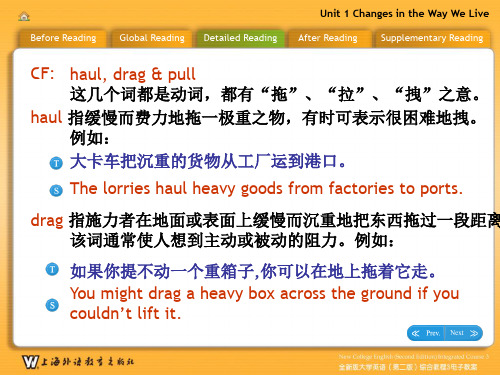
on balance: with all things considered 我想,总的来说我更喜欢新的操作系统。 I think, on balance, I prefer the new operating system. On balance, it’s probably not advisable to change the company’s name. NB: balance 的反义词是 imbalance。此外,与 balance 有关的 其他搭配有: keep one’s balance 保持平衡 lose one’s balance 失去平衡 strike a balance 力求折中 in the balance 不确定,成败或安危未定
CF: device, instrument & implement 这几个词都可用作名词,都有“用具”、“器具”之 意。
Unit 1 Changes in the Way We Live
Before Reading Global Reading Detailed Reading After Reading Supplementary Reading
Unit 1 Changes in the Way We Live
Before Reading Global Reading Detailed Reading After Reading Supplementary Reading
CF: profit, interest & advantage 这几个词都可用作名词,均有“利益”、“好处”之意。 profit 指在物质与精神方面的好处,但以金钱方面为主。例如: 公司为今年制定了较高的赢利目标。 The company has targeted a quite high profit for the year. interest 当“利益”讲时常用复数形式。例如: 公务员应该为公众谋利益。 A public servant is to work in the interests of the public.
全新版大学英语3(第二版) Unit1
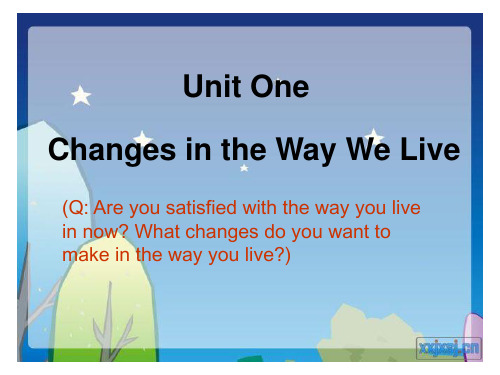
Summary & Lead-in :
People change their place of residence(居 住地) because they look for things that their previous life is unable to provide. However, once life has been changed, they may miss the good old days.
• Useful expressions:
• decent air to breathe, cows or sheep in green fields enclosed by hedges or stone walls, and fields of wheat and barley, peace, relief / relaxation • escape from the crowds/find a quiet place far from the human race; escape from the pollution of the city; whenever you need a bit of room to move when life becomes too fast, you can always find relief at last out in the country.
1. How does the writer think he and his family will feel when they have to leave the farm someday? 2. Why did the writer and his family choose to live in the country? Have they finally realized their dream?
商务口译
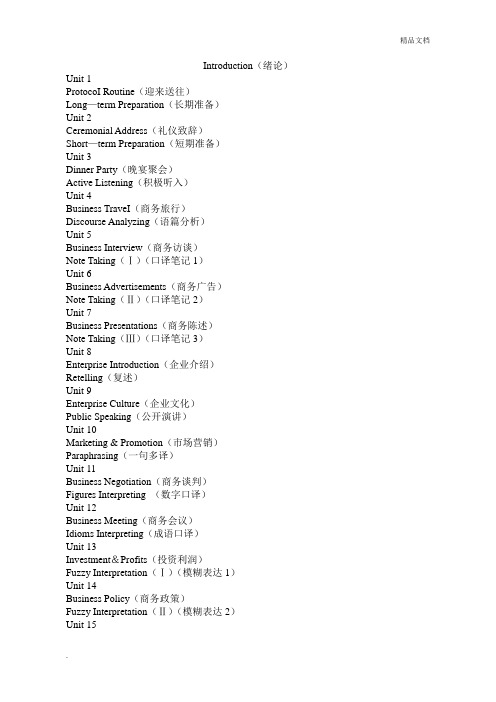
Introduction(绪论)Unit 1ProtocoI Routine(迎来送往)Long—term Preparation(长期准备)Unit 2Ceremonial Address(礼仪致辞)Short—term Preparation(短期准备)Unit 3Dinner Party(晚宴聚会)Active Listening(积极听入)Unit 4Business TraveI(商务旅行)Discourse Analyzing(语篇分析)Unit 5Business Interview(商务访谈)Note Taking(Ⅰ)(口译笔记1)Unit 6Business Advertisements(商务广告)Note Taking(Ⅱ)(口译笔记2)Unit 7Business Presentations(商务陈述)Note Taking(Ⅲ)(口译笔记3)Unit 8Enterprise Introduction(企业介绍)Retelling(复述)Unit 9Enterprise Culture(企业文化)Public Speaking(公开演讲)Unit 10Marketing & Promotion(市场营销)Paraphrasing(一句多译)Unit 11Business Negotiation(商务谈判)Figures Interpreting (数字口译)Unit 12Business Meeting(商务会议)Idioms Interpreting(成语口译)Unit 13Investment&Profits(投资利润)Fuzzy Interpretation(Ⅰ)(模糊表达1)Unit 14Business Policy(商务政策)Fuzzy Interpretation(Ⅱ)(模糊表达2)Unit 15International Exhibition(国际会展)Fuzzy Interpretation(Ⅲ)(模糊表达3)Unit 16Public Relations(公共关系)Sight interpreting《视译练习)Unit 17Business Strategy(商务策略)Shadowing(影子跟读)Unit 18Transportation & Logistics(交通物流)Quality Assessment (质量评估)U n i t F o u rB u s i n e s s T r a v e lUnit Objectives (单元目标)After reading this unit, you should➢understand the ways to identify the main ideas of the source text.➢find ways to improve your interpreting skills and performance.➢master the basic words and expressions about business travel.➢know some cultural background knowledge about business travel.PreparingI. Interpreting Skills (口译技能)Read the following presentation about discourse analysis and try tounderstand the four speech types and know how to identify the mainideas of the source text. Then complete the following task:1. Listen to the passage, “My first day in New York”, and answer the followingquestions:1). When did the author first arrive in the US?2). What did the author do on the way to his hotel?3). Where did the author get something to eat after his friend had left?4). Why couldn’t he have what he really wanted at the restaurant?5). What did the author do after dinner?2. Listen to the passage again and try to catch more details, and then retell thestory in your own words.Decoding Training (II): Discourse Analysis(语篇分析)Interpreting is to “understand and make understood”. To interpret the speech, one must first understand the message of the speech. However, comprehension(理解)of the source discourse goes beyond the simple recognition of words and linguistic structures. The interpreter shall make an analysis of the source discourse. More importantly, the interpreter shall identify(识别)the speech type and know how to identify the main ideas of the original speeches.Identification of the Speech TypesSpeeches are diversified serving different occasions and purposes. It will be of great help to the interpreters if they know the speaker’s style. In most cases, speeches are prepared beforehand. Therefore, a study of the different types of writing helps an interpreter identify the main idea of a given speech. Following are the basic types of writing.1. Descriptive WritingDescriptive(描述性的)writing involves a great deal of detailed information. A descriptive discussion aimed at providing details of an event, a scene, a procedure, or a situation.This speech type demands a thorough background investigation of the speaker and the relevant situation by the interpreter.2. Narrative WritingNarrative(叙述性的)writing focuses on the development of events. There is no doubt that the interpreter should be very sensitive to dates, time phrases, and verb tenses when a narrative speech is dealt with.3. Expositive WritingExpositive(说明性的)writing deals with its subject matter in such orders as chronological, spatial, comparison, and definition. It would be to the advantage of the interpreter to conduct a background investigation of the speaker and the situation, for that would provide the interpreter with not only thenecessary glossary but also the speaker’s standpoint(立场).4. Persuasive WritingPersuasive(劝说性的)writers always want to make their arguments clear, strong and convincing. When the purpose is to convince, writers of persuasive writing mainly employ two techniques -- induction(归纳)and deduction(推论). Inductive writing starts with specific examples or points to draw a general conclusion, while deductive writing illustrates its thesis at first and then supports and reinforces the thesis through specific examples or subordinate ideas.Identification of the Main IdeasIn the context of interpreting, the main ideas of the source speech can be identified at the sentence level and at the discourse level. Priority should always be attached to identifying the main idea at the sentence level. We argue that identification of main ideas be done on the basis of sentences. Training in identifying the main ideas in interpreting should naturally take place first at the sentence level.1. Sentence LevelThe most important task for an interpreter to identify the main ideas at the sentence level is to discern (洞悉)the subject, verb and object (SVO). It is highly significant for the interpreter to catch the SVO of the sentence while listening to the source text, as the SVO usually carries the major information of the sentence. For example, when listening to “The best way to carry money while traveling is to have a major credit card”, the interpreter is expected to catch “The best way is to have a credit card.” If the interpreter is able to catch the SVO of the sentence, he then will produce a complete sentence with the major information in the target language.2. Discourse LevelThere are also some skills an interpreter might employ on different occasions for grasping the gist (要点)of a speech at the discourse level. In a well-organized speech, the speaker usually explains his point in the first few sentences. Therefore, one of the ways to get the main idea of a speech is to attach priority to the beginning of the speech. Secondly, if the interpreter encounters a speech that is inductively constructed, the interpreter should, to the best of their ability, conduct a study of the speaker's background and viewpoints so that they can follow the speaker's logical guidelines.II. Phrase Interpreting (短语口译)Work on the following words and phrases. Interpret them into Chineseand English respectively.A. English to Chinese1. Have a population of…2. Cover an area of…3. Date back to…4. Have a history of…5. Be situated in…6. The gross domestic product7. Dive-in restaurant 8. Quarantine certificate9. Duration of stay 10. Residence permitB. Chinese to English1、日程安排2、旅行路线3、起飞时间4、机场大楼5、候机室6、贵宾室7、问讯处8、安全检查9、免税店10、个人物品III. Sentence Interpreting (句子口译)Work on the following sentences. Interpret them into Chinese andEnglish respectively.A. English to Chinese1. I believe you're going out of your way for us.2. Wouldn't you like to spend an extra day or two here?3. I'm afraid that won't be possible, much as we'd like to.4. I wonder if it is possible to arrange shopping for us.5. I will keep you posted.B. Chinese to English1. 我特地为你们安排,使你们在北京的逗留愉快。
routine

routineRoutineIntroduction:A routine is a set of habitual activities or tasks that individuals follow on a regular basis. Having a routine can bring structure and consistency to our daily lives, allowing us to effectively manage our time and increase productivity. This document will explore the importance of having a routine, its benefits, and how to establish and maintain a successful routine.I. Importance of Having a RoutineA. Structure and Organization1. A routine provides structure to our lives by dividing our time into specific activities and tasks.2. It allows us to prioritize our activities and effectively manage our time.3. A well-structured routine ensures that important tasks are not neglected and helps prevent procrastination.B. Increased Productivity1. Following a routine helps us improve efficiency and productivity.2. Routines provide a sense of direction and purpose, enabling us to stay focused on our goals.3. Completing tasks regularly and consistently builds momentum and enhances productivity.C. Better Time Management1. Having a routine helps us allocate time for different activities, such as work, exercise, relaxation, and hobbies.2. It allows us to optimize our use of time, ensuring that we have enough time for each task.3. With proper time management, we can reduce stress and achieve a better work-life balance.II. Benefits of Having a RoutineA. Reduced Stress1. A routine reduces decision fatigue by automating certain tasks.2. Knowing what to expect and having a plan in place reduces anxiety and increases a sense of control.3. A well-established routine can help individuals cope with stress more effectively.B. Improved Health and Well-being1. Following a routine promotes a healthy lifestyle by incorporating regular exercise, balanced meals, and adequate rest.2. Prioritizing self-care increases overall well-being and reduces the risk of burnout and fatigue.3. A routine can also contribute to better mental health by allowing time for relaxation and activities that promote happiness and fulfillment.C. Enhanced Focus and Concentration1. Routines eliminate distractions by providing a structured environment.2. It helps individuals focus on important tasks, reducing procrastination and increasing productivity.3. Regular routines improve cognitive function and promote better concentration.III. Establishing and Maintaining a Successful RoutineA. Define Goals and Priorities1. Identify short-term and long-term goals to establish the foundation of the routine.2. Determine the key tasks and activities that align with these goals.B. Create a Schedule1. Allocate specific time slots for each task or activity.2. Consider individual preferences and energy levels when assigning time slots.3. Ensure a balanced schedule with enough time for work, rest, and recreation.C. Stick to the Routine1. Consistency is key to maintaining a successful routine.2. Avoid making frequent changes to the routine unless necessary.3. Over time, the routine will become a habit and easier to follow.D. Adaptability1. Recognize that life can be unpredictable, and adjustments may be necessary occasionally.2. Be flexible and adjust the routine as needed, while ensuring the core activities are still prioritized.Conclusion:Having a routine brings structure, organization, and increased productivity to our lives. It allows for better time management, reduced stress, improved health and well-being, and enhanced focus and concentration. To establish and maintain a successful routine, setting goals, creating a schedule, and sticking to the routine are essential. While adaptability is important, consistency is key. By embracing a routine, individuals can lead more balanced, purposeful, and fulfilling lives.。
java中routine方法

java中routine方法在Java编程中,routine方法是指一系列重复性、规律性的操作。
这类方法通常用于处理一些日常任务,例如文件操作、数据库操作、网络请求等。
本文将介绍routine方法在Java中的应用场景、如何使用routine方法优化代码以及举例说明其优势和局限性。
1.Java中routine方法的定义和作用在Java中,routine方法通常是一个静态方法,它包含了一系列预定义的操作,用于执行一些常见的任务。
这些方法的主要作用是封装重复性的代码,提高代码的可读性和可维护性。
通过使用routine方法,开发者可以避免在多个类或方法中编写相同的代码,从而减少代码冗余和错误。
2.routine方法的应用场景routine方法在Java中的应用场景非常广泛,主要包括以下几类:- 文件操作:如读取、写入、删除文件等。
- 数据库操作:如连接数据库、查询数据、更新数据等。
- 网络请求:如发送HTTP请求、处理响应数据等。
- 数据处理:如加密、解密、压缩、解压缩等。
- 系统配置:如获取系统属性、设置系统参数等。
3.如何使用routine方法优化代码要使用routine方法优化代码,首先需要识别哪些部分代码是重复的、规律性的操作。
然后,将这些操作封装到一个或多个routine方法中。
以下是一个简单的例子:```java// 原始代码String fileContent = readFile("input.txt");String encryptedContent = encrypt(fileContent);String compressedContent = compress(encryptedContent); writeFile(compressedContent, "output.txt");// 使用routine方法优化public static String readFile(String fileName) {// 读取文件内容的代码}public static String encrypt(String content) {// 加密代码}public static String compress(String content) {// 压缩代码}public static void writeFile(String content, String fileName) { // 写入文件内容的代码}4.举例说明routine方法的使用以下是一个使用routine方法处理数据库操作的例子:```javaimport java.sql.Connection;import java.sql.DriverManager;import java.sql.PreparedStatement;import java.sql.ResultSet;public class DatabaseRoutine {public static Connection getConnection() {Connection connection = null;try {Class.forName("com.mysql.jdbc.Driver");String url = "jdbc:mysql://localhost:3306/mydb";connection = DriverManager.getConnection(url, "username", "password");} catch (Exception e) {e.printStackTrace();}return connection;}public static void executeQuery(Connection connection, String sql) {try {PreparedStatement preparedStatement = connection.prepareStatement(sql);ResultSet resultSet =preparedStatement.executeQuery();while (resultSet.next()) {// 处理查询结果}resultSet.close();preparedStatement.close();} catch (Exception e) {e.printStackTrace();}}public static void main(String[] args) {Connection connection = getConnection();if (connection != null) {executeQuery(connection, "SELECT * FROM users");connection.close();}}}```5.总结routine方法的优势和局限性优势:- 提高代码可读性和可维护性:将重复性、规律性的操作封装到routine 方法中,使代码更加简洁清晰。
- 1、下载文档前请自行甄别文档内容的完整性,平台不提供额外的编辑、内容补充、找答案等附加服务。
- 2、"仅部分预览"的文档,不可在线预览部分如存在完整性等问题,可反馈申请退款(可完整预览的文档不适用该条件!)。
- 3、如文档侵犯您的权益,请联系客服反馈,我们会尽快为您处理(人工客服工作时间:9:00-18:30)。
U n i t O n eP r o t o c o l R o u t i n eUnit Objectives (单元目标)After reading this unit, you should➢understand what and how to prepare for the interpreting tasks in the long run.➢find ways to improve your interpreting skills and performance.➢master the basic words and expressions about protocol routine.➢know some cultural background knowledge about protocol routine.PreparingI. Interpreting Skills (口译技能)Read the following presentation about long-term preparation and try tounderstand what and how to prepare for the interpreting tasks in the longrun. Then discuss with your partners the following questions:1. How do you usually prepare for a reception task?2. Is preparation necessary in interpreting? Why/Why not?3. What and how shall an interpreter prepare for a reception-interpreting task?4. What kind of interpreting skills do you think an interpreter should master?Preparing Training (I): Long-term Preparation(长期准备)Interpreting is a highly demanding profession. Interpreters only accept assignments for which they are qualified. If an interpreter accepts a task that is beyond their abilities, the resulting poor performance will surely reflect negatively on their client as well as themselves. In order to have a professional performance in interpreting, interpreters must be sufficiently prepared for their job. A well-prepared interpreter is usually confident and relaxed.Two Types of Pre-interpreting PreparationWith regard to the work of preparation, some must be prepared in the long run, while others can only be prepared shortly before the interpreting task is taken. In this sense, the pre-interpreting preparation can be divided into two types, namely long-term preparation(长期准备)and short-term preparation(短期准备).1. Long-term PreparationLong-term preparation means that interpreters shall be prepared every day for the potential interpreting tasks. It is essential for the successful career of a professional interpreter. For an interpreter, there is no point at which the work is finished. An experienced interpreter never stops preparing for the interpreting tasks! Preparation is an interpreter’s lifelong job. The more preparation they make, the better performance they will have.2. Short-term PreparationIn contrast with long-term preparation, short-term preparation is more direct and efficient. It refers to the job that can only be prepared shortly before the task is taken. After the interpreter is informed of an incoming interpretation task, they start their preparation immediately. Such preparation is highly necessary for the successful accomplishment of a certain interpreting task. In fact, the pre-interpreting preparation usually refers to the short-term preparation.What and How to Prepare in the Long RunProfessional interpreters may have the opportunity to work with a vast range of subjects. They may work for international organizations, private companies and trade unions as well as all types of meetings and conferences. In order to become a professional interpreter, they are required to have a strong sense of duty(责任感), a high level of linguistic proficiency(语言能力), wide encyclopedic knowledge (百科知识)and a good mastery of interpreting skills(口译技巧). These qualities are not achieved in one day and they deserve trainees’ continuous efforts in the long run.1. What to Prepare?Interpreters, therefore, should constantly make preparations for their jobs. An important task for aninterpreter to prepare in the long term is the mastery of broad general knowledge and a large glossary. To complete an interpretation task, interpreters are also advised to improve their skills in decoding, message recalling and reconstructing. Interpreters must learn to listen actively, memorize the information effectively, and re-express the message smoothly. All these skills deserve interpreter s’life-long learning.2. How to Prepare?As for how to make long-term preparation for interpreting, it is advisable for the trainees to keep on practicing field interpreting(现场口译), reading widely and learning to collect information. As the saying goes, “Practice makes perfect.”Interpreters should do more interpreting exercises and grasp every chance to do field interpreting.They should also read widely to enlarge their vision and get more knowledge and information.II. Phrase Interpreting (短语口译)Work on the following words and phrases. Interpret them into Chineseand English respectively.A. English to Chinese1. Recover from the jet lag 倒时差2. Thoughtful Arrangement 周到的安排3. Hospitability 热情好客4. Souvenir 纪念品5. Accommodations 食宿6. Claim baggage 提取行李7. Proceed through the customs 进行海关检查8. Itinerary 活动安排9. Farewell speech 告别词10. Adjust to the time difference 适应时差B. Chinese to English1. 为……设宴洗尘to hold a banquet in honor of...2. 向……告别to bid farewell to...3. 不远万里来到……to come all the way to...4. 您先请to be/feel honored...5. 久仰大名I have long been looking forward to meeting you.6. 欢迎辞a welcoming address7. 赞美to pay tribute to 8. 回顾过去to look back9. 展望未来to look ahead 10. 慢走happy memoryIII. Sentence Interpreting (句子口译)Work on the following sentences. Interpret them into Chinese andEnglish respectively.A. English to Chinese1. I would like to extend, on behalf of the Chinese government and people and in my own name, our cordial greetings and best wishes to your people.1. 我谨代表中国政府和人民,并以我个人的名义,向贵国人民致以亲切的问候和良好的祝福。
